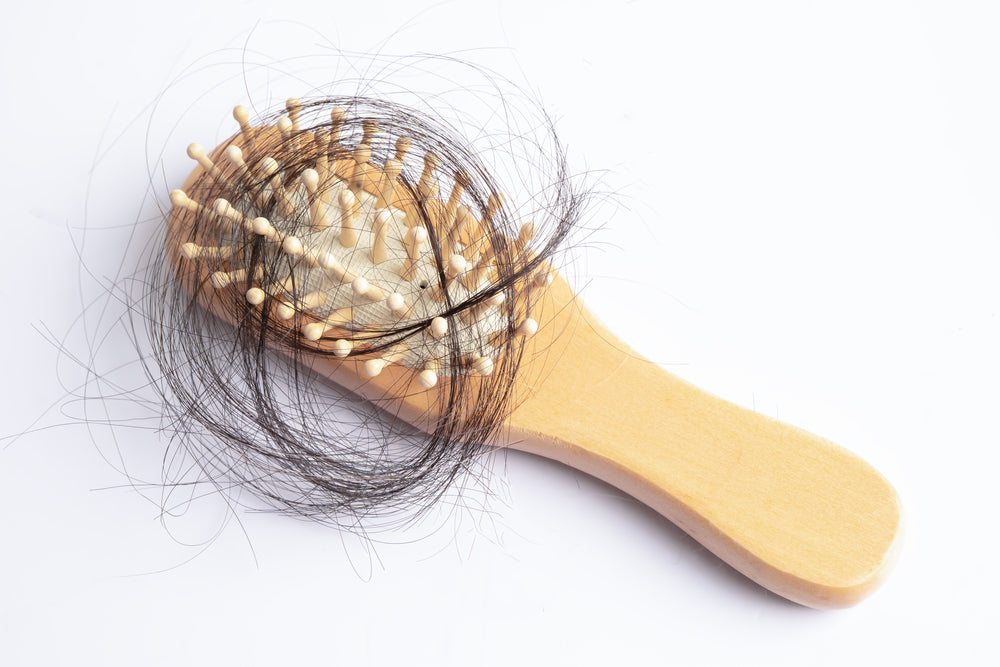
Can Oral Health Cause Hair Loss?
|
Time to read 5 min
|
Time to read 5 min
Oral health is related to overall wellness. And being healthy is beautiful! So what do healthy hair and strong teeth have in common? Can Oral Health Cause Hair Loss? We cover all your concerns.
Teeth and hair share similar development processes, but their structural components differ. Hair shafts are made of keratin filaments, which are extremely cross-linked. The tooth enamel matrix is composed of enamel proteins that are destroyed and replaced with minerals in the process of maturing enamel. Mineralized enamel is only a tiny amount of organic material that hasn't been properly characterized. According to a study conducted by researchers, it was discovered that there is a close connection between recurrent tooth infection and hair loss, particularly alopecia areata. In medical terms, alopecia areata is an autoimmune condition where the normal cells begin turning against themselves, causing patches on the scalp, beard, or eyebrows.
If you have concerned about does gum disease cause hair loss or can poor oral health cause hair loss? Then the answer is Yes because poor oral health could be connected to hair loss; experts agree that, at times, the events can be linked in unexpected ways. This is especially true if the hair loss is a result of alopecia areata, which is an autoimmune skin condition in which cells that are normally healthy turn against themselves. Alopecia areata refers to hair loss that occurs when the immune system mistakenly attacks hair follicles where hair growth begins.
The damage degree differs from patient to patient; however, one truth about alopecia areata is that it creates circular patches. Researchers believe patients could have greater chances of regaining hair after the condition is resolved. However, there are possibilities that one might fail to regrow hair.
Gum recession is the process by which the margin of the tissue that surrounds the teeth wears away toward the tooth root. If you don't take good care of your teeth, that can lead to gum recession. Poor brushing habits, not flossing, and not using antibacterial mouthwash can all result in the buildup of tartar on the teeth and other oral health problems that can cause hair loss.
Wisdom teeth often develop in an incorrect position, usually erupting in a lower position and pushing against the molars in front of them. These teeth emerge fully at the age of 18-24, and the final position does not change later. It is also possible that the wisdom teeth become trapped (impacted), so they are not able to break through the gum. If your wisdom teeth have been removed, it can cause different health problems, such as hair loss.
Do you know the relationship between fluoride and hair loss? A lot of people view their thin hair as an indication of ageing. However, the reality is that hair loss is caused by a variety of sources. Chemicals and environmental factors can play a part in the loss of hair. Fluoride is an ion that belongs to fluorine, which is a chemical element belonging to the halogen family. A lot of communities incorporate fluoride into the water system in order to reduce the risk of cavities and improve the health of their mouths. Too much Fluoride, or fluoride poisoning, could be one of the reasons why people suffer from hair loss, even though there are no definitive studies in this field.
The great thing about Alopecia areata, a tooth infection, is that it can be reversed and treated. If symptoms are detected in the beginning, both the infection, as well as hair loss is easily addressed. Patients will often experience hair growth without treatment after one year. However, if you take care of your teeth by properly brushing and cleaning your teeth with our fluoride-free toothpaste , then there is no chance your teeth get infected which leads to hair loss.
Effective bad breath remedies include:
Gentle and regular scraping of the tongue
Regular oral care practices such as daily brushing and flossing
Professional deep cleanings and plaque removal
The ongoing use of oral probiotics.
One, the probiotics compete with the existing bad bacteria and reduce their presence by “crowding them out”
Two, the probiotics produce BLIS or “bacteriocin-like-inhibitory-substances” which is a technical way of stating that one probiotic strain (bacteria) can produce a substance that inhibits or kills off other bacteria. Three, by working to control gingivitis, gum disease and tooth decay these probiotics reduce the very sources of bacteria-generated odors in the mouth.
Studies have shown a clear reduction in plaque levels and gingivitis symptoms when oral probiotics were administered to patients with moderate to severe gingivitis.


